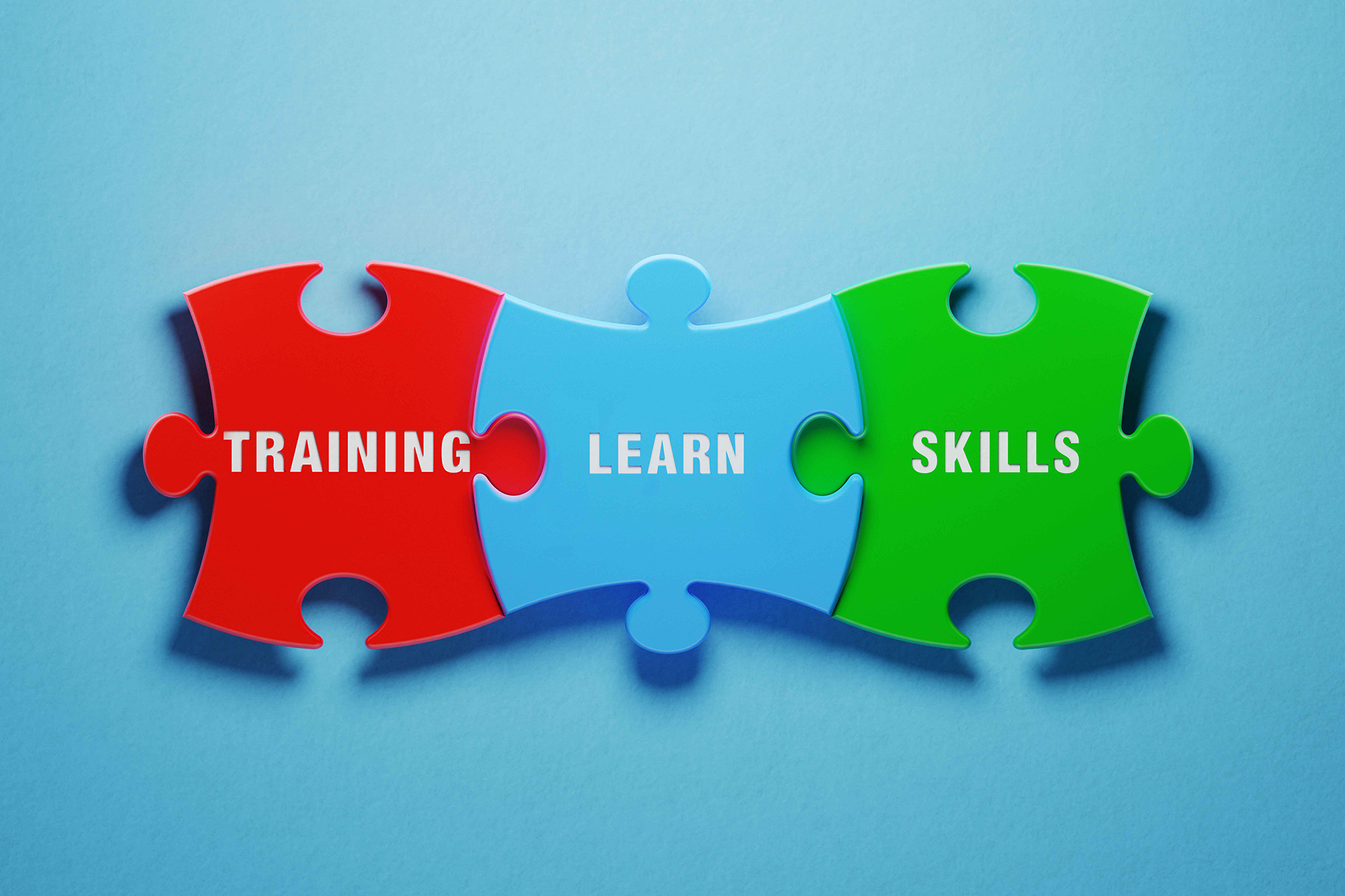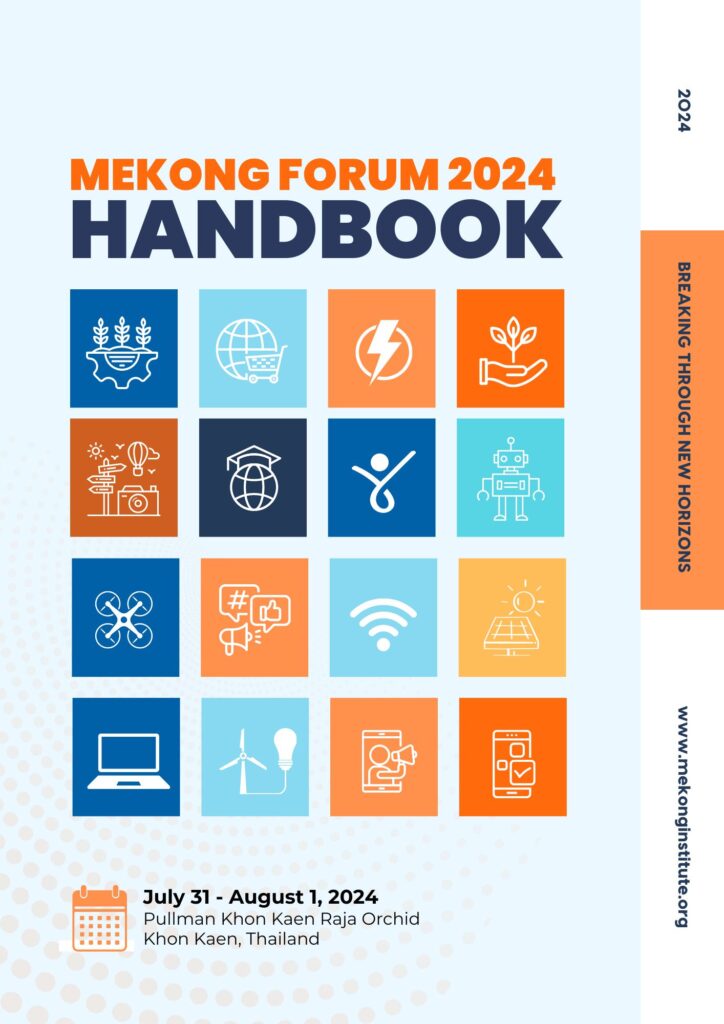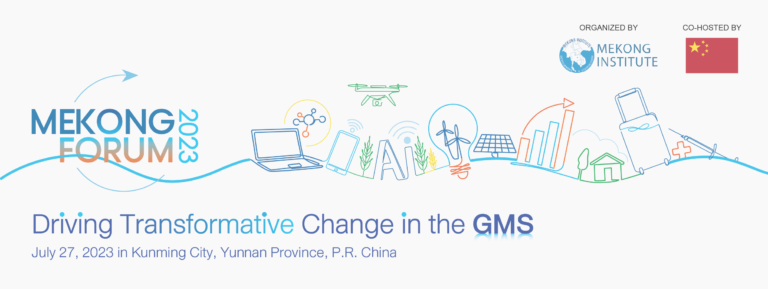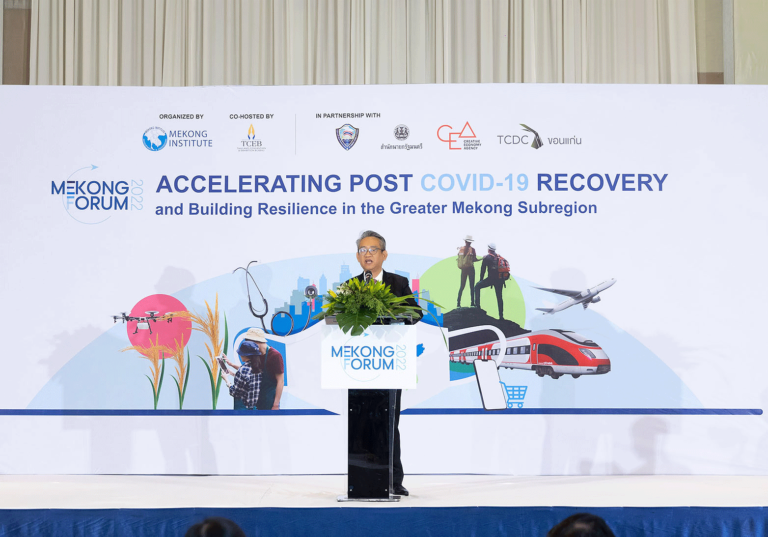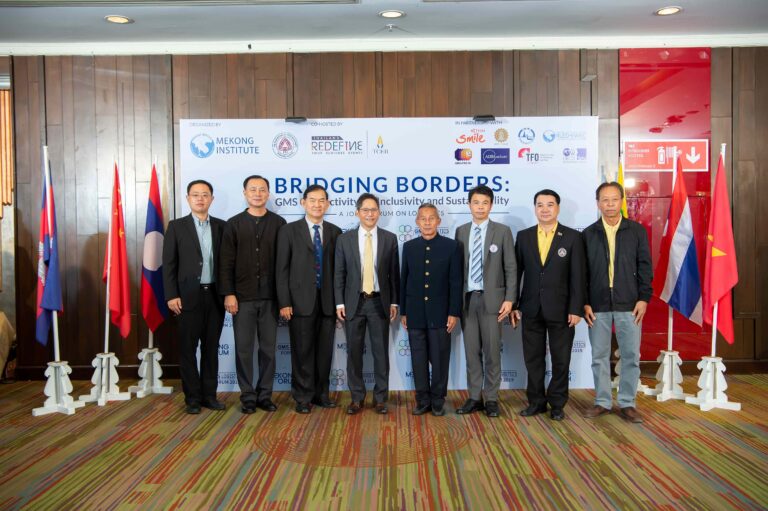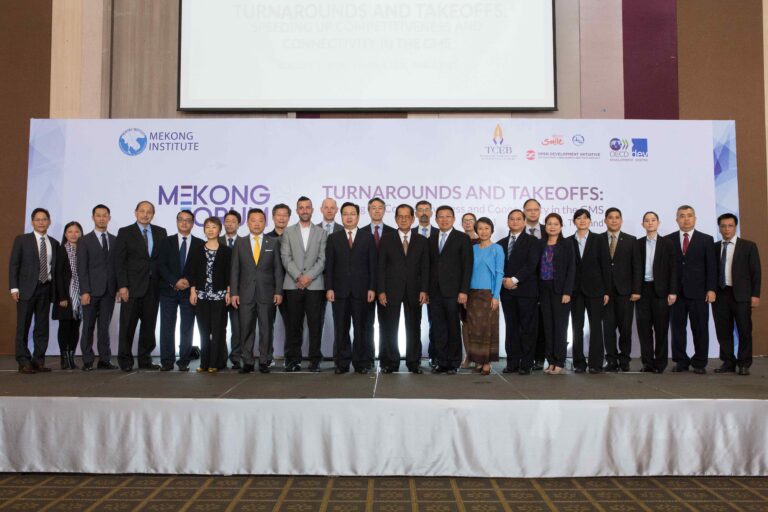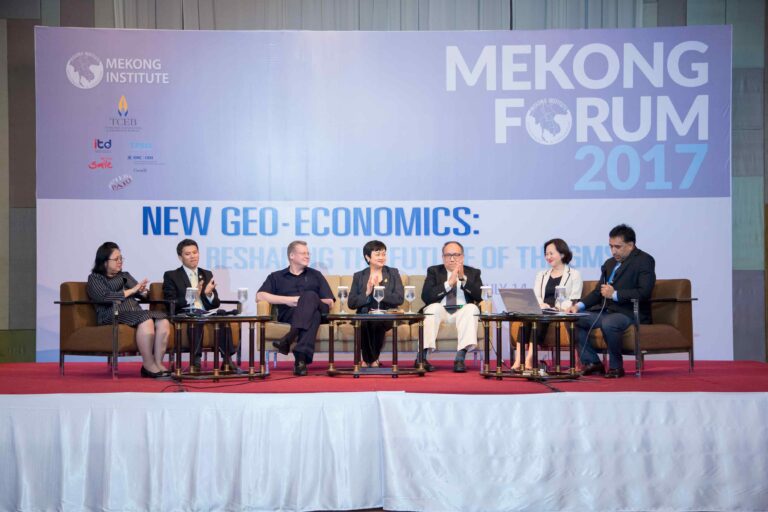The Greater Mekong Subregion (GMS)’s diverse economies are increasingly recognizing the transformative potential of digitalization, innovation, and technology (DIT) across key sectors such as agriculture, trade, energy, and the environment. As countries strive towards sustainable growth, a digital and technological revolution is inevitable. This revolution promises to redefine the region’s socio-economic landscape, driving sustainable development and inclusive growth. However, realizing this promise requires a strategic approach to harnessing the transformative power of DIT as fuel for meaningful change.
The Mekong Forum, Mekong Institute (MI)’s annual flagship event, is a comprehensive and multidimensional platform highlighting opportunities across the subregion’s key sectors, such as food and agriculture, trade, logistics, energy, environment, innovation, and social inclusion. It is a holistic and inclusive conference, engaging participants from various sectors, including government officials, industry leaders, academics, nongovernmental organizations, and community representatives. By bringing together these diverse voices, the forum aims to foster rich dialogues, share innovative practices, and cultivate partnerships that drive sustainable development and regional integration. Emphasizing an all encompassing approach, the forum facilitates a unique space for cross-sectoral and interdisciplinary collaboration, encouraging participants to explore synergies, address shared challenges, and leverage collective expertise to advance the GMS development agenda.
This year, the Mekong Forum is envisioned as a catalyst for developing a comprehensive innovation strategy for the GMS and setting a unified direction for the Mekong’s digital future. With the theme “Digital Horizons: Scaling up Digitalization, Innovation, and Technology in the GMS,” it will harmonize efforts across the subregion by aligning with broader regional frameworks such as the Greater Mekong Subregion Economic Cooperation Program Strategic Framework 2030 (GMS-2030), the ASEAN Digital Integration Framework, the Master Plan on ASEAN Connectivity 2025, and the Global Development Initiative (GDI). These frameworks emphasize the importance of digital integration and connectivity as pillars for economic progress and resilience, offering a blueprint for the Mekong countries to navigate their digital transformation journey.
By integrating the principles and strategic directions outlined in these regional frameworks, the forum seeks to ensure that the Mekong’s approach to DIT is forward-looking and cohesive with the broader Southeast Asian region’s aspirations. This alignment is crucial for championing a digital ecosystem that is robust, inclusive, and capable of transcending borders, thereby enhancing regional integration and competitiveness in the areas of agriculture, trade, energy, and environment.
Moreover, the forum will explore how digital and technological advancements can be leveraged to address the subregion’s unique challenges and opportunities. This includes bridging digital divides, cultivating a vibrant innovation ecosystem, and promoting sustainable development.
The plenary session is the cornerstone of the Forum, providing a comprehensive overview of Digital and Information Technology (DIT) across the GMS. It examines the current landscape, opportunities, and challenges of DIT adoption in Mekong countries. Featuring country-specific presentations, it aims to showcase diverse approaches to enhance learning, capacity building, and innovation amidst the digital revolution. The dialogue focuses on national strategies, success stories, and collaborative strategies to overcome barriers to digitalization through cross-border cooperation and shared learning.
The Mekong Forum 2024 aims to lay the groundwork for a subregional innovation strategy consistent with the GMS-2030 and ASEAN’s digital and connectivity agendas and tailor-made for the diverse needs and ambitions of the GMS. To achieve this, it will pursue the following objectives:
- SHOWCASE AND ENHANCE CROSS-SECTORAL INTEGRATION: Highlight the profile of the subregion’s DIT in agriculture, trade, energy, and the environment while promoting the synergies between these sectors.
- FACILITATE KNOWLEDGE EXCHANGE AND SHARING OF BEST PRACTICES: Establish the forum as a multistakeholder platform for exchanging insights, experiences, and effective practices in DIT to enhance learning and adaptation in the GMS.
- FORMULATE ACTIONABLE STRATEGIES FOR INCLUSIVE DIT: Identify actionable strategies and initiatives to bolster the DIT ecosystems across the GMS, specifically addressing the digital divide to foster inclusive growth and social equity.
- CRAFT POLICY RECOMMENDATIONS FOR HOLISTIC DIGITAL INTEGRATION: Develop policy recommendations that facilitate and support comprehensive digital integration across key sectors, including agriculture, trade, energy, and environment, ensuring sustainability at its core.
- ENHANCE REGIONAL AND INTERNATIONAL COLLABORATION: Strengthen ties and forge new partnerships within the GMS and with ASEAN member states, international organizations, and the private sector to capitalize on DIT advancements for the dual goals of economic growth and social inclusivity.
The forum will begin with a plenary session featuring the official welcome and opening remarks, followed by keynote speeches:
- THE STATE OF DIT IN THE GMS: Opportunities and Challenges
This plenary session is the cornerstone of the Forum, offering a comprehensive overview of DIT across the GMS. This session will delve into the current landscape of DIT within Mekong countries, exploring opportunities presented by the digital era alongside the different stages of adaptation and the challenges accompanying rapid technological advancement and integration.
Featuring country-specific presentations, this session aims to showcase each country’s diverse approaches and methodologies to enhance learning, build capacity, and foster innovation in the face of a digital revolution. Speakers representing their respective countries will share insights into national strategies, success stories, ongoing initiatives, and the issues they face in adapting to and embracing digital transformation. This dialogue will highlight the progress made and stimulate discussion on collaborative strategies to overcome barriers to digitalization. It will examine how cross-border cooperation and shared learning can accelerate the adoption of innovative technologies, improve digital literacy, and ensure inclusive access to digital resources regionally.
- BRIDGING THE DIGITAL DIVIDE: Strategies for Inclusive Digital Transformation
This plenary session serves as a critical platform for addressing one of the most pressing challenges in the era of rapid technological advancement: ensuring equitable access to digital resources and opportunities. As digitalization accelerates, it promises enhanced connectivity, improved efficiency, and new economic opportunities. However, it also risks widening the gap between those with and without access to digital technologies.
This session aims to shed light on the multifaceted nature of the digital divide, exploring the disparities in access to digital infrastructure and internet connectivity and the digital skills and literacy crucial for meaningful participation in the digital economy. The presentation will outline the strategies and initiatives implemented across the GMS to foster an inclusive digital transformation. It will include policies for enhancing digital infrastructure in underserved areas, programs designed to improve digital literacy and skills among all population segments, and innovative solutions to ensure the benefits of digitalization are accessible to all, including vulnerable and marginalized communities. The session will also explore the role of public-private partnerships, international cooperation, and community-driven initiatives in bridging the digital divide.
- FOSTERING A REGIONAL INNOVATION ECOSYSTEM: Policies, Partnerships, and Platforms
This plenary session serves as a prelude to the breakout discussions, setting the stage for a deeper exploration of how the region can cultivate a conducive environment for DIT. This session will highlight important components of building a regional innovation ecosystem, focusing on the synergies between government policies, collaborative partnerships, and digital platforms.
The session will also highlight successful models of partnerships that span across sectors, including government-industry-academia collaborations, which have been instrumental in nurturing innovation and research and development activities within the region. Moreover, the discussion will extend to opportunities on existing digital infrastructure and platforms that are essential for the DIT ecosystem, emphasizing the importance of connectivity, data accessibility, and digital tools that enable collaboration and knowledge sharing across borders. It lays the groundwork for the succeeding breakout sessions, where participants will zoom into specific areas of interest.
Breakout sessions offer parallel and focused discussions, providing participants with the opportunity to delve deeper into the key thematic areas of the forum or explore the diverse landscapes of digital horizons. Development partners will be invited to host some of the breakout sessions under the thematic areas below.
- TERRAIN 1 – Revolutionizing Food Systems for a Sustainable
Tomorrow: Digital Transformations in Mekong’s Agriculture Sector
In the GMS, agriculture provides livelihoods for a significant portion of the population and plays an essential role in cultural identity and social stability. However, this vital sector is currently at a crossroads, facing challenges from multiple fronts—climate change, environmental degradation, urbanization, and the pressures of feeding a growing population sustainably.
The current landscape of DIT in the subregion’s agriculture sector reveals a patchwork of progress. On one end, there are areas where digital technologies have started to make inroads, transforming traditional agricultural practices by introducing precision farming, digital marketplaces, and mobile applications for agricultural advice. Innovations such as drones for aerial imagery, IoT devices for soil and water monitoring, and blockchain for supply chain transparency are beginning to show their potential to enhance productivity, resource efficiency, and market access.
While there are potentials, the widespread adoption of these technologies is hindered by challenges such as access to infrastructure, digital literacy, and the availability of affordable and relevant technological solutions tailored to the smallholder farmers’ needs. The digital divide remains a significant barrier, with rural areas and small-scale producers often left behind in the digital transformation journey.
The GMS-2030 emphasizes the importance of leveraging digital technologies to enhance agricultural productivity, market access, and climate resilience, advocating for integrated approaches to develop digital infrastructure and skills. Concurrently, the aforementioned ASEAN frameworks prioritize cultivating digital literacy among farmers, developing digital platforms for agricultural trade, and implementing smart farming technologies.
Against this backdrop, this thematic area will explore the dynamics at which the GMS’s agricultural sector stands and the transformative potential of DIT as levers for sustainable development. Specifically, it aims to:
- Assess digital adoption in agriculture across the GMS, identifying successful models, practices, and barriers to wider adoption;
- Initiate a comprehensive dialogue on how the agriculture sector can capitalize on digital technologies to (a) enhance resilience to climate change, (b) ensure regulatory compliance to national and international food safety standards, and (c) improve local and global market access and integration of smallholders.
- TERRAIN 2 – Harnessing DIT for Inclusive and Secure Trade and Finance in the GMS
As the GMS strides towards an era of unprecedented digital transformation, the trade and finance sectors stand at the forefront of this evolution. Over recent years, there has been a notable surge in cross-border trade activities driven by increased connectivity and economic integration efforts among GMS countries. Concurrently, the finance sector has transformed, with advancements in digital technologies facilitating greater access to financial services and advancing innovation in financial transactions. Despite these progressions, challenges such as disparities in infrastructure development, regulatory frameworks, and financial inclusivity persist.
In line with the GMS-2030 and related ASEAN frameworks, this thematic area will focus on harnessing the potential of digitalization to propel the trade and finance sectors towards greater efficiency, inclusivity, and sustainability. Specifically, it aims to:
- Discuss the impact of digital advancements on regional finance and trade activities;
- Identify the latest digital innovations and technology-driven solutions that can revolutionize trade and finance in the GMS, leveraging digitalization to streamline cross-border investments; and
- Encourage GMS countries to adopt digital solutions that can speed up trade, make it easier for more people to get access to financial services, and help achieve sustainable development goals.
- TERRAIN 3 – Powering the Future: Tech-Driven Energy Solutions in the GMS
The energy industry across the GMS strives to achieve a just transition towards renewable sources, recognizing the urgent need to address the far-reaching impacts of climate change. This transition aims to diversify the energy mix and reduce dependency on fossil fuels while meeting the region’s escalating energy demands.
However, the GMS faces the challenge of fueling its dynamic economies while mitigating the impacts of climate change. The GMS-2030 identifies energy as a key sector for innovation and cooperation, advocating for the integration of advanced technologies to enhance energy efficiency, expand renewable energy sources, and fortify the reliability and security of the region’s energy systems. The ASEAN Digital Integration Framework and Master Plan on ASEAN Connectivity 2025 highlight the importance of digital innovation in the energy sector, promoting smart grids, digital twin technologies, and blockchain for energy distribution optimization and cross-border energy trade.
Specifically, it aims to:
- Identify and Promote Emerging Technologies: It seeks to identify and showcase cutting-edge technologies that have the potential to enhance energy efficiency, reliability, and sustainability significantly. By highlighting these innovations, it aims to inspire further research, investment, and adoption of advanced technologies across the region.
- Showcase National Practices for Scaling Up: The session will showcase successful national practices and initiatives that have effectively scaled up to the regional level and aims to facilitate cross-border learning and collaboration by sharing best practices and success stories, enabling other countries within the region to replicate and adapt successful models.
- Encourage Regional Cooperation: It seeks to foster greater regional cooperation in the development and implementation of tech-driven energy solutions. By bringing together stakeholders from across the GMS, the session aims to facilitate dialogue, collaboration, and the exchange of ideas and expertise, ultimately paving the way for joint initiatives and partnerships to address common energy challenges.
- TERRAIN 4 – Inclusive Digital Societies: Engaging Women and Youth in Accelerating DIT Adoption in the GMS
Inclusive digital societies are crucial because they ensure that everyone, regardless of gender, age, or socio-economic status, has access to and can benefit from digital technologies. By bridging digital divides and fostering equitable access, inclusive digital societies create opportunities for all individuals to improve their quality of life and contribute to their communities.
This session supports the strategic objectives of DIT set in the GMS-2030 and the ASEAN frameworks. Each framework emphasizes inclusivity, innovation, and connectivity as key drivers for sustainable development, focusing on leveraging digital technologies to empower underrepresented groups, including women and youth.
Participants will gain insights into the strategies and actions necessary to ensure that the benefits of digital technologies are distributed equitably across all segments of society. The goal is to foster an environment where women and youth are not only participants but also leaders and innovators in the digital economy, thereby contributing to the overall socio-economic development of the GMS.
- TERRAIN 5 – Enhancing GMS Tourism through Digital Pathways
Tourism in the GMS holds significant economic value and stimulates cross-cultural exchanges. However, the industry faces numerous challenges, including the need for sustainable management practices, enhancing tourist experiences, and recovering from global disruptions such as the COVID-19 pandemic. DIT presents opportunities to address these challenges and transform the tourism sector.
This thematic area aligns with the overarching objectives of the GMS-2030 and the ASEAN frameworks related to DIT as it targets to spur the digital transformation of the tourism sector in the GMS. It conforms with regional strategic frameworks to promote sustainable, inclusive, and integrated economic development.
By focusing on digitizing tourism, the session aims to explore ways to use digital technologies to enhance tourism services and ensure the sector’s resilience and competitiveness. Participants will gain insights into leveraging digital innovations to enhance tourism experiences. Specifically, this part will:
- Explore how digital tools can support sustainable tourism management, including environmental conservation, cultural heritage preservation, and community-based tourism initiatives;
- Discuss the role of digital platforms in improving regional connectivity, facilitating travel, and promoting integrated tourism experiences across the GMS;
- Identify strategies to mobilize digitalization for crisis management and recovery, enhancing the sector’s resilience to global disruptions and challenges; and
- Examine how digitizing tourism can generate economic opportunities for local communities, SMEs, and marginalized groups, contributing to inclusive growth across the GMS.
- TERRAIN 6 – Digitizing the Path to Environmental Stewardship:
Digital Technologies and Innovations for the Environment
The environmental sector in the GMS presents a landscape of both opportunities and challenges as the region balances economic development with environmental conservation. Despite its rich biodiversity and ecosystems, the subregion faces increasing pressure from rapid economic development, urbanization, and climate change impacts.
The GMS-2030 emphasizes sustainable development as a core objective, advocating for the integration of environmental considerations into economic and development planning. While the ASEAN Digital Integration Framework promotes digital innovations for improved resource efficiency, reduced environmental footprints, and cross-border sharing of environmental data and best practices, the Master Plan on ASEAN Connectivity 2025 supports the development of smart and green cities in the GMS.
Against this landscape, this thematic area aims to optimize digital transformation as a pathway to environmental stewardship, syncing with broader regional and global sustainability agendas. Specifically, it aims to explore innovative digital solutions for waste management, water conservation, and pollution control, contributing to the reduction of the ecological footprint of GMS economies.
- TERRAIN 7 – Reimagining Education:
Evolving Capacity Development through DIT
This thematic area aims to explore DIT’s transformative potential in reshaping the region’s education sector. In the digital era, there is a need for innovative educational frameworks that can adapt to rapid technological advancements and changing labor market demands. This thematic focus will explore methodologies and approaches developed and implemented to enhance educational delivery, improve access to learning, and equip learners of all ages with the skills necessary for the 21st century.
This session will center around integrating digital tools and platforms in educational settings, from schools to higher education, vocational training centers, and adult learning. It will highlight successful case studies of e-learning, mobile learning, and blended learning models that have shown promise in increasing engagement, personalizing education, and bridging the digital divide among learners in various environments.
- Exhibition and Technology Demonstrations
Tech companies, startups, and research institutions will be invited to set up interactive booths to demonstrate their latest digital innovations, tools, and applications relevant to agriculture, trade, energy, and the environment.
- Engagement Photo Pod
A photo booth will be available for participants to capture their perspectives on the Forum’s thematic areas. They will be provided with a pen and paper to jot down their insights, which they can then display while posing for a picture.
- National and Local Media Collaboration
Members of the national and local media will be invited to participate and cover the event.
- Social Media Integration
The Plenary Session will be streamed live across MI’s official social media channels.
MI is thrilled to offer a unique opportunity for development organizations, tech companies, startups, and research institutions to exhibit their cutting-edge digital innovations, tools, and applications during the Mekong Forum 2024 to be held from July 31 – August 1 at Pullman Khon Kaen Raja Orchid Hotel, Khon Kaen, Thailand.
Who should exhibit?
We are seeking exhibitors from a wide range of technology sectors, including but not limited to:
- Artificial Intelligence and Machine Learning
- Blockchain and Fintech
- Internet of Things (IoT)
- Smart Cities and Urban Tech
- Environmental and Sustainability Tech
- Agritech and Food Security Solutions
Areas of Focus
Exhibitors are encouraged to showcase innovations, tools, and applications specifically relevant to:
- Agriculture: Precision farming, smart irrigation, crop monitoring, etc.
- Trade: Digital supply chains, e-commerce solutions, trade facilitation technologies, etc.
- Energy: Renewable energy technologies, smart grids, energy efficiency tools, etc.
- Environment: Climate change mitigation, pollution control, water management, smart cities, etc.
- Capacity Development: Education, skills development, etc.
Registration
The cost to participate as an Exhibitor is free of charge. Interested exhibitors, kindly register no later than June 28, 2024 at: https://bit.ly/3V2Fdxh
See the terms and conditions here.
The forum will bring together about 300 participants from a diverse group of stakeholders involved in the advancement of digital transformation in the region. This includes government officials and policymakers from GMS countries, who play a pivotal role in shaping the digital landscape through regulatory frameworks and public initiatives.
Representatives from international organizations, NGOs, and civil society are also targeted, given their significant contributions to promoting digital inclusivity and addressing societal challenges through technology. Additionally, the forum will engage academics, researchers, and experts in digitalization, technology, and innovation.
Business leaders, entrepreneurs, and investors within the digital and technology sectors are invited to share their experiences, explore new opportunities, and contribute to a collaborative ecosystem that promotes technological advancement and economic growth in the GMS.
Media representatives are also expected to join and cover the event, amplifying crucial information and lessons about leveraging DIT for sustainable and inclusive development. Their presence will help disseminate key insights to a broader audience, facilitating greater awareness and understanding of the forum’s objectives and outcomes.
There is no admission fee to the event, while we understand that you will arrange your travel and accommodation and other associated costs.
The registration is now open. Please register before July 22, 2024 at this link: www.mekonginstitute.org/mekong-forum-2024-event-registration-for-participants/
- General Information:
The Mekong Forum 2024 will be organized in Khon Kaen, Thailand, and run for 2 days on Wednesday July 31 – Thursdsay August 1, 2024. - Event venue: The event venue is Pullman Khon Kaen Raja Orchid Hotel. The address is 9-9 Prachasumran Road, Nai Muang Mueang Khon Kaen District, Khon Kaen 40000
- Hotel Rate at the Event Venue:
The rate for standard rooms is 1,600 – 1,800 THB (45USD – 51USD). To reserve the room, please fill in this reservation form and send to: [email protected] or call (+66) 43 913 333 for further information. Kindly notify the hotel staff to apply Mekong Forum special rate for Mekong Forum participants. - Other Hotel Options
▪Ad Lib HotelRoom rate: Single occupancy at 2500 THB and double occupancy at 2850 THB
Email: [email protected]
Phone: 043 100 555Glacier Hotel
Room rate: start from 1,200 THB
Email: [email protected]
Phone: 061-176-4499KOSA Hotel
Room rate: start from 1,480 THB
Email: [email protected]
Phone : 043 320 320Charoenthani Hotel
Room Rate: start from 1,100 THB
Email: [email protected]
Phone: 043-220400-14 - Transportation:
You’re recommended to organize your ground transportation on your arrival and departure day. Taxis are available at the airport. The fare to most hotels downtown is around 200 THB (5 USD). To get around the city, you can download “Grab” application and install on your mobile phone. You can choose to pay in cash or via credit card. - Language: English is the main communication medium of the event.
- Dress Code: Business casual
Should you have any question about logistics, please contact our administrative lead:
Ms. Natchaya Potiwat at [email protected].
For other technical issues or event overall, please contact our Communications and Knowledge Management Manager:
Ms. Anusara Tanpitak at [email protected]

